Don't wanna be here? Send us removal request.
Photo










Various pages and illustrations from a 1905 Spanish edition of the Book of Saint Cyprian.
2K notes
·
View notes
Text
Russian names: pet names
As in, names for loved ones, not for pets, although those are fun, too.
(I’ve been considering a post like this for a long time, and then I got an ask requesting it, so I decided to go ahead and pick up my drafts. Dear person who requested it, I’m very sorry, I accidentally clicked “send” before I took note of your URL, that’s why I’m not tagging you. Credits for prompting this are yours, anyway.)
Most Russian partners and spouses address and refer to each other by the diminutives or their first names, sometimes using a slightly different version than everyone else (Vitka or Vitenka, rather than just Vitya, Yurka or Yurochka rather than Yura), but generally, they use the same names for each other as their siblings and close friends use for them.
Also, Russians in general (especially Russian men, Georgi Popovich notwithstanding) are a little (okay, a lot) more reserved than people in a lot of other countries; ending every phone call with “I love you”, making sure there are always fresh flowers in the house and bringing each other breakfast in bed isn’t something that happens very often, not even in novels..
Therefore, not a lot of Russians make up pet names for each other, call each other something new and sweet every day or even explicitly say “I love you” at all.
That said, pet names still do exist, and people do use them - sometimes sincerely, and sometimes jokingly or even in mocking.
Before I begin my three-page rant on Russian nicknames, I’d like to make sure we’re clear about three things.
First, my transliteration isn’t the only correct way to spell it. There’s often no right way to transliterate some words or letters, so if you see and like some other way to spell some word - go ahead and use that, it most possibly doesn’t matter. Just watch out for o/a and e/i in unstressed syllables (it’s YurOchka, VitEnka), because those, if spelled wrong, look like spelling mistakes rather than alternative transliterations.
Second, YMMV. Russia is huge. Dialects exist. People are different. There’s a good chance someone may use some words differently, and that’s okay.
Third, I hope everyone’s aware that it’s also okay to use any words you like in your fanfic, even if they only sound Russian, or don’t even sound Russian at all; it’s your text, you’re the one who’s creating the universe your characters live in; the Russia in your fanfic doesn’t have to be exactly the same as the Russia that exists in our world.
If, however, you want to stick to the real-life Russian pet names, this text is for you.
The first thing that’s important to remember when picking a Russian endearment is gender. A lot of Russian words aren’t gender-neutral, and using the wrong gender makes it hilarious if the person is secure in their gender or offensive, if they have gender-related issues. So please, make sure you pick a gender-neutral word or use the correct version of a gendered one. I marked all feminine words with an f, and all masculine with an m, and explicitly stated if the word is gender-neutral.
The word most frequently used in fanfic, “дорогой(m, dorogoy)/дорогая(f, dorogaya)” is, indeed, the equivalent for “darling”, but in real life it’s hardly ever used as an endearment. Instead, it’s more of a word for old married couples: “Dorogaya, you ruined my life, - You’re not exactly a gift yourself, dorogoy!”. It’s used ironically or jokingly much more often than as an actual way to address someone you love. It’s also the same word as “expensive”, so statements like “Moya dorogaya is very dorogaya, that’s the third silver necklace this week” aren’t unheard of.
Much more often used is “милый(m, miliy)/милая(f, milaya)”. It basically means the same - “dear/darling” - but sounds more gentle and intimate. Young women use that, along with lubimiy, on girly forums to refer to their boyfriends (”Last night miliy said that I…”).
Keep reading
1K notes
·
View notes
Text
Russian names: pet names
As in, names for loved ones, not for pets, although those are fun, too.
(I’ve been considering a post like this for a long time, and then I got an ask requesting it, so I decided to go ahead and pick up my drafts. Dear person who requested it, I’m very sorry, I accidentally clicked “send” before I took note of your URL, that’s why I’m not tagging you. Credits for prompting this are yours, anyway.)
Most Russian partners and spouses address and refer to each other by the diminutives or their first names, sometimes using a slightly different version than everyone else (Vitka or Vitenka, rather than just Vitya, Yurka or Yurochka rather than Yura), but generally, they use the same names for each other as their siblings and close friends use for them.
Also, Russians in general (especially Russian men, Georgi Popovich notwithstanding) are a little (okay, a lot) more reserved than people in a lot of other countries; ending every phone call with “I love you”, making sure there are always fresh flowers in the house and bringing each other breakfast in bed isn’t something that happens very often, not even in novels..
Therefore, not a lot of Russians make up pet names for each other, call each other something new and sweet every day or even explicitly say “I love you” at all.
That said, pet names still do exist, and people do use them - sometimes sincerely, and sometimes jokingly or even in mocking.
Before I begin my three-page rant on Russian nicknames, I’d like to make sure we’re clear about three things.
First, my transliteration isn’t the only correct way to spell it. There’s often no right way to transliterate some words or letters, so if you see and like some other way to spell some word - go ahead and use that, it most possibly doesn’t matter. Just watch out for o/a and e/i in unstressed syllables (it’s YurOchka, VitEnka), because those, if spelled wrong, look like spelling mistakes rather than alternative transliterations.
Second, YMMV. Russia is huge. Dialects exist. People are different. There’s a good chance someone may use some words differently, and that’s okay.
Third, I hope everyone’s aware that it’s also okay to use any words you like in your fanfic, even if they only sound Russian, or don’t even sound Russian at all; it’s your text, you’re the one who’s creating the universe your characters live in; the Russia in your fanfic doesn’t have to be exactly the same as the Russia that exists in our world.
If, however, you want to stick to the real-life Russian pet names, this text is for you.
The first thing that’s important to remember when picking a Russian endearment is gender. A lot of Russian words aren’t gender-neutral, and using the wrong gender makes it hilarious if the person is secure in their gender or offensive, if they have gender-related issues. So please, make sure you pick a gender-neutral word or use the correct version of a gendered one. I marked all feminine words with an f, and all masculine with an m, and explicitly stated if the word is gender-neutral.
The word most frequently used in fanfic, “дорогой(m, dorogoy)/дорогая(f, dorogaya)” is, indeed, the equivalent for “darling”, but in real life it’s hardly ever used as an endearment. Instead, it’s more of a word for old married couples: “Dorogaya, you ruined my life, - You’re not exactly a gift yourself, dorogoy!”. It’s used ironically or jokingly much more often than as an actual way to address someone you love. It’s also the same word as “expensive”, so statements like “Moya dorogaya is very dorogaya, that’s the third silver necklace this week” aren’t unheard of.
Much more often used is “милый(m, miliy)/милая(f, milaya)”. It basically means the same - “dear/darling” - but sounds more gentle and intimate. Young women use that, along with lubimiy, on girly forums to refer to their boyfriends (”Last night miliy said that I…”).
Keep reading
1K notes
·
View notes
Photo

“Vasilisa Mikulishna” by Boris Olshansky.
Vasilisa Mikulisha is a polenitsa - a woman warrior in russian epics (bylina).
In the epic, her husband Stavr Godinovich impertinently boasted about his wife’s beauty and intelligence in a court of Prince Vladimir. For that the Prince put him in a jail, and Vasilisa Mikulishna had to save her husband.
893 notes
·
View notes
Text

ASTROLOGY RESOURCES
Hey I will be posting a bunch of resources that will help you understand Astrology better in depth. Disclaimer that these meanings aren’t limited and even the most amazing and talented Astrologers are still learning today therefore this is basic information and it is not limited. :)
Have fun learning Astrology 🪐 I’ll make more posts if needed (part 2, part 3, etc.)
BRIEF ABOUT ASPECTS
Conjunction: Union
Semi- sextile: 1 sign apart
Sextile: Ease (2 signs apart)
Square: Tension (3 signs apart)
Trine: Harmony (4 signs apart)
Quincunx: Discord (5 signs apart)
Opposite: Need balance (Balance) (Six signs apart)
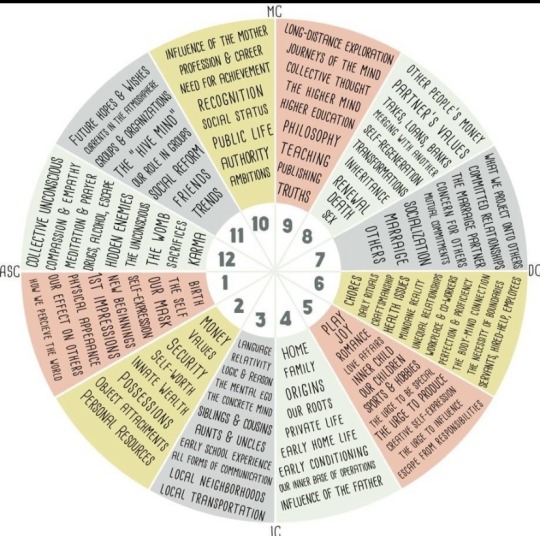


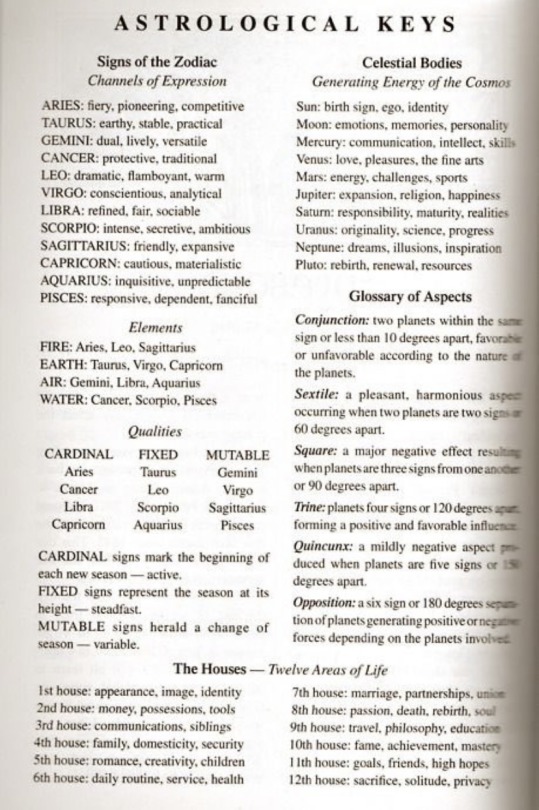
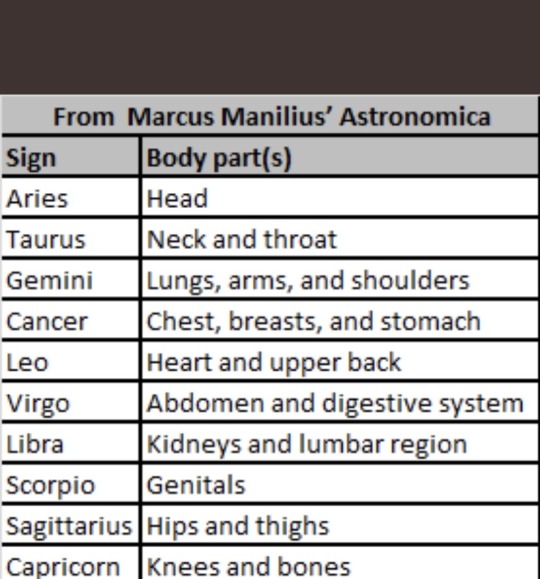

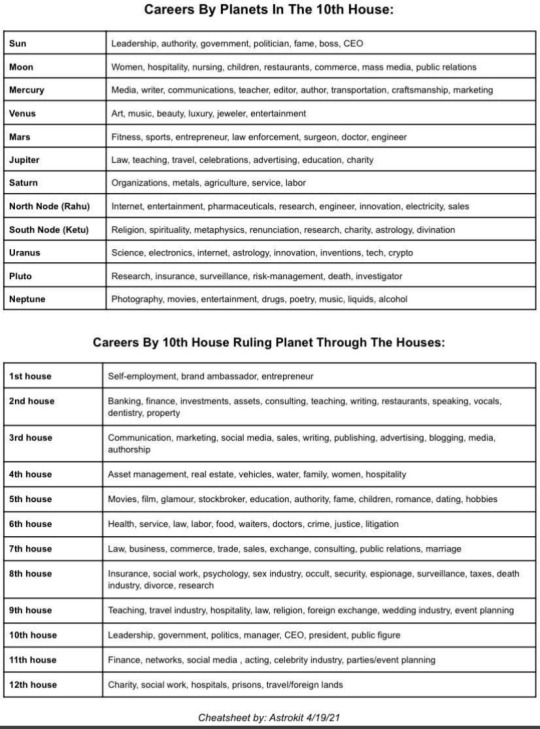
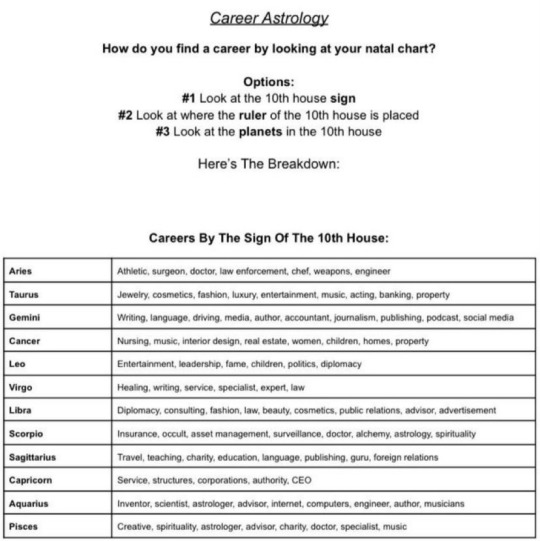

© Hillarysss 2021 all rights reserved (Divine Hillary / Hills)
🦋✨ Twitter (Astrology & Divination content)
5K notes
·
View notes
Text
Dominant Houses
Few Tumblr astrologers are aware that “dominant houses” exist, but they do. And unlike many other factors of the natal chart, they’re very easy to figure out (and explain, luckily for me). Since dominant houses aren’t considered an important feature, the only real method available on the internet for calculating them is to simply label the house with the most planets in it dominant (and yes, there can be ties). That’s definitely the easiest plan, but as always, I’m going to suggest a way to over-complicate it all. Sound fun? Good.
—STEP ONE Understand the houses. This seems obvious, but I feel the need to say it anyway. There are lots of things to familiarize yourself with and you can do that {here}.
—STEP TWO Count the planets within each house; the one with the most is your dominant house. OR - Give four points for the sun and the moon. - Give three points for Mercury, Venus, and Mars. - Give two points for Jupiter and Saturn. - Give one point for Uranus, Neptune, and Pluto. - Give one point to a house in a sign of its native element. - Give two points to a house in its native sign (watch out for interceptions). - Give half a point to Chiron, Juno, Ceres, Vesta, Pallas, Lilith, and N. Node. - Give a quarter of a point to angular houses with neutral or positive aspects. - Deduct a quarter of a point from angular houses with negative aspects.
The house with the most points is your dominant house. Yes, as I mentioned before, there can be ties – if two houses somehow have the same score, they’re both equally dominant. I’d say use the top three. Also, I consider the house with the sun it in a dominant house no matter its score.
INTERPRETATION Basically, when a house is dominant, it just means that the area of life it’s associated with will be amplified, or at least very important to you & your identity. I suggest using the page I linked in Step One to find out what the houses are all about, but below are simple generalizations of what it means when each house is dominant.
First house: your appearance & impression are important to you. Second house: your possessions & security are important to you. Third house: your communication & cognition are important to you. Fourth house: your home, family, & history are important to you. Fifth house: your feelings & expression are important to you. Sixth house: your health & well-being are important to you. Seventh house: your relationships & others’ happiness are important to you. Eighth house: your awareness & transformations are important to you. Ninth house: your knowledge & experience are important to you. Tenth house: your career & reputation are important to you. Eleventh house: your community & progression are important to you. Twelfth house: your inner world & vulnerabilities are important to you.
5K notes
·
View notes
Video
youtube
its so freaking beautiful.
I just want to shoot cardboard boxes and styrofoam blocks in my room all day.
I will get it one day.
4 notes
·
View notes
Photo
Is this a break barrel or bolt? I only have a few hand guns and a pump rifle and I HATE the pumping!

I got a Ultra red dot for my Crosman 2300S pellet pistol. My old eyes have a had time with iron sights. This pistol sure does shoot good, and is really quiet for shooting in the backyard.
11 notes
·
View notes
Text
Your Questions About People Search Engines USA
Richard asks…Which is a good people search engine in the USA?SearchBy answers:Zabasearch.com - you can do a people search by name and a search by phone number. Also, whitepages.com where you can search for people, a business or conduct a reverse phone look up.Betty asks…I need a good USA search engine for people finders and history on them.Are there any that truly work?SearchBy answers:Zabasearch.com - whitepages.com - pipl.com - or deepweb search engine lookups.Donald asks…How come when I do people search online, I can only search within the USA?Why is the internet so, I don’t know, I guess the best word would be ethnocentric? It assumes that everyone lives in the USA. It seems to be the default country. I go to public search
People Search Engines USA
1 note
·
View note
Text
Family Tree Research
How to Make a Family Tree and How to Trace Your Family Tree What is a family tree? A family tree is basically a chart containing information that illustrates in a graphical format the relationships of family members back through time. A family tree shows family connections between each individual family member, and consists of their full names with parental and marital connection lines. embeddable family tree updated live from WikiTree The above family tree example is taken from wikitree.com. They also have blank family tree templates that you can print out and fill in your family tree by hand. They also have family tree widgets that you can set up to record your family members. First Name: Last Name:
Family Tree Research
1 note
·
View note
Text
The Process for Genealogy Research
The genealogy research process uses intricate methods to demonstrate kinship and can use historical records and at times even genetic analysis. The success of the genealogy research will depend on the quality of the sources used and the information within these sources. The first step that a genealogist takes is to compile all family documents, records, and knowledge from living relatives. Genealogy research starts with the present and works backward in time. Names and Dates Special care must be taken with names, dates, and places. Family names are one of the most important pieces of information for genealogy research. However, they are often a source of considerable confusion for many researchers. Names - The name of a person
Genealogy Research
1 note
·
View note
Photo

This is too much awesomeness !
Posted on FB from Twisted Twigs on Gnarled Branches Genealogy page.
(And yes, I will want this for mine heehee)
118 notes
·
View notes
















